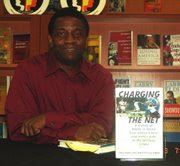


With every powerful serve and deft ground stroke, with every graceful volley and determined charge to the net, black tennis players – from Hall of Famers Althea Gibson, Arthur Ashe, Evonne Goolagong, and Yannick Noah to future legends James Blake and the sisters Venus Williams and Serena Williams – have forced open the sport’s shuttered gates and demanded to be acknowledged.
In Charging the Net, Cecil Harris and Larryette Kyle-DeBose draw on personal interviews and extensive research to chronicle the humiliations and triumphs of blacks in professional tennis from the 1940s to the present. For many fans and writers Ashe, Gibson, and the Williams sisters personify the achievement of African-Americans in tennis, but others too have made their mark. Charging the Net spotlights a wide range of competitors as well as the American Tennis Association, an organization that thrived despite racial segregation, thanks to such benefactors as Dr. R. Walter Johnson.
The book also introduces readers to two black officials whose success was short-lived; both have sued the United States Tennis Association, alleging discrimination based on race, gender, and age.
Harlem-trained, Harvard-educated James Blake, who overcame career-threatening injuries to achieve World Top Ten status, has written a Foreword to Charging the Net. The Afterword is written by Robert Ryland, the first black to compete in a major college tournament, who later found the doors to tennis’s premier venues marked “Whites Only.” With a clear vision, this eighty-six-year-old coach now looks at how far blacks in tennis have come and how far they have yet to travel.
With 8 pages of photographs.
Cecil Harris has written on sports for Newsday, the New York Post, The Sporting News, and USA Today, and has covered tennis for The Indianapolis Star and for Gannett Suburban Newspapers (now The Journal News) in
Larryette Kyle-DeBose is a player-captain in the Atlanta Lawn Tennis Association. She has worked as a photojournalist for the Swazi Times in









